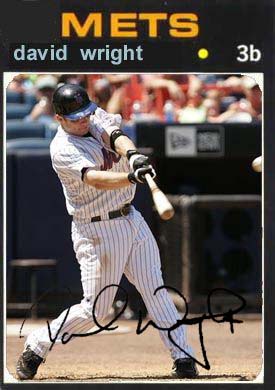Mike Piazza was the face of the Mets when I got into the team, so I will always see him as the primary face of the club.But, perhaps, I should see Wright that way.
He was so good in the early going that we almost took for granted that one day he'd no longer post gaudy numbers, that one day he'd no longer be a Met, that one day he'd retire.
Naturally, all of the above happened, but not before he forged an incredible legacy.
I remember when he first came up in 2004. He was so highly touted that anything less than stardom would've been a letdown. Scads of Mets top prospects have gone bust, but Wright tore it up from the very get-go, at the young age of 21.
At 22, he played 160 of 162 games. It was his 2005 season that really let us know he was for real. Who can forget that barehanded catch? That's the one defensive play by Wright I remember most vividly.
From 2005 through 2008, he was otherworldly, averaging 29 homers, 112 RBI, 22 steals, 106 runs and 42 doubles per season. And he was still just 25 at the end of the run!
But something happened in 2009. The first cracks started to show. He still batted .307, but his homers fell to 10 and his RBIs to 72. His strikeouts skyrocketed to 140.
And from then on, he just wasn't the same Wright. It's crazy we only had prime Wright—the one that could hit homers, steal bases and post a high average—for four full seasons.
Sure, he was GOOD from 2009 on. He had 29 homers and 103 RBI in 2010, but his average was a less-stellar .283 and his 161 Ks were an eyesore. 2011 was a mulligan, the first inkling of how injury-prone he was to become, but 2012 was such a rebound campaign that it made it look like the old Wright, the prime Wright, was back. 21 homers, 93 RBI, 15 steals, a .306 average—and the Ks were down to 112.
Guess that was the last real hurrah. From 2013 to 2016, he averaged just 80 games per season. He had his moments, hitting .307 with 18 dingers and 17 steals in 2013, but 2014 to 2016 were so lackluster you just knew he was about done—despite being just 33 years old in 2016.
Wright was a great ballplayer, but he was just further proof that we just can't win wholly. There's always SOMETHING that keeps us from having that complete victory without any hiccups or asterisks or mars or black spots. Wright started to fall apart after four prime seasons. Santana's no-hitter should've been a one-hitter because a foul ball actually hit the chalk. That sort of thing.
Seaver is perhaps the one example that breaks that mold.
But still, we have to appreciate what we had. He was a third baseman—a third baseman!—for a team that has historically had trouble finding someone to consistently fill that position. He spent 14 years in the big leagues—all with the Mets. He was a first round pick and top prospect that actually paid off. He made seven All-Star Games, won two Gold Gloves and won two Silver Sluggers. He was a veritable star, not just with the Mets, but league-wide.
Oh, he's definitely a what-could-have-been. But he was a darn good what-actually-was, too.
He's on the Hall of Fame ballot as we speak, narrowly reaching the 5% threshold last year by earning 6.2% of the vote. Whether he continues to stick around remains to be seen, but the writers kept him around for another look, which is awesome enough. And with enough momentum, there is actually the chance someone who was a pure Met might make the Hall!
That, too, is awesome.
Well, in the Mets Hall of Fame project I run on another website, he was elected with 100% of the vote on his first try, so that's a little something.
David Wright was truly something else. How great it was that he was on this team.

















